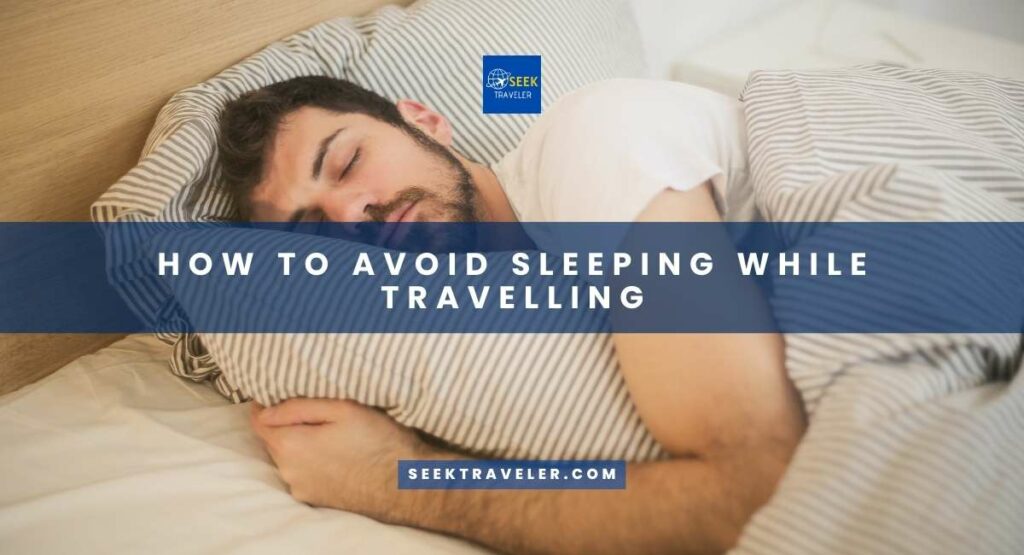As a frequent traveler, I know how challenging it can be to stay awake and alert during long journeys. Whether you’re on a plane, train, or bus, the monotony of sitting for hours on end can quickly lull you into a deep slumber. But if you’re traveling for work or pleasure, sleeping through your trip is not an option. That’s why I’ve developed some strategies over the years to help me avoid dozing off while en route.
First and foremost, getting enough rest before your trip is crucial. If you start your journey already exhausted, it will be much harder to stay awake and focused. Make sure to get a good night’s sleep before leaving and avoid staying up late packing or finishing last-minute work tasks.
Additionally, incorporating some physical activity into your travel routine can help keep you energized throughout the journey. By following these tips and more like them below, you’ll be able to arrive at your destination feeling refreshed and ready to take on whatever adventure awaits!
Get Enough Rest Before Your Trip
You gotta make sure you’ve had enough rest before you hit the road, so your body’s ready for whatever comes your way. One of the tips for improving sleep quality is to establish a consistent sleep schedule.
This means going to bed and waking up at the same time every day, even on weekends. Our bodies love consistency, so this will help regulate our internal clock and make it easier to fall asleep and stay asleep.
Another tip is to create a relaxing bedtime routine. This could include taking a warm bath or shower, reading a book, or listening to calming music. By doing these activities consistently before bed, our bodies will learn that it’s time to wind down and prepare for sleep.
It’s important to avoid stimulating activities like watching TV or using electronic devices right before bed as they can interfere with our body’s natural sleep process.
Getting enough rest before travelling is crucial because being tired on the road can be dangerous and uncomfortable. So take some time to establish healthy sleep habits in your daily life before your trip.
When we’re well-rested, we have more energy which makes it easier for us to stay active during our travels – but that’s a topic we’ll get into next!
Stay Active During Your Trip
Keep your body moving and shake off the stagnant energy of sitting for long periods by stretching your legs, taking a brisk walk, or even doing jumping jacks to get your blood flowing.
Outdoor activities are a great way to stay active during travel. Hiking, biking, swimming, and kayaking are all excellent options to explore new surroundings while getting some exercise.
Sightseeing options can also be incorporated into staying active during travel. Walking tours are popular in many cities and allow you to see the sights while getting some steps in. Museums and galleries often have large spaces that can be explored on foot as well.
Even shopping can be turned into an activity by walking from store to store instead of taking a taxi or public transportation.
Staying active during your trip not only helps prevent sleepiness but also improves overall health and well-being. So next time you’re traveling, try incorporating some outdoor activities or sightseeing options into your itinerary to keep your body moving throughout the day. And remember, keeping your mind engaged is just as important as keeping your body active!
Keep Your Mind Engaged
Don’t miss out on the opportunity to expand your knowledge and engage your mind during your trip by exploring local museums, galleries, and cultural sites. Visiting these places not only provides you with a glimpse of the local culture but also stimulates your brain.
Take in the art and architecture or learn about historical events that shaped the community. Brain teasers are another way to keep yourself engaged while travelling. These puzzles challenge your thinking abilities and can be found in books or online.
If you’re looking for something more hands-on, try picking up a creative hobby like painting or writing. Not only does it give you an outlet for self-expression, but it also keeps your mind occupied during those long travel days. Bring along a sketchbook or journal and jot down ideas as they come to you. You never know what inspiration may arise from being in a new environment.
Keeping your mind active is essential when travelling for extended periods, especially if you don’t want to fall asleep during transit times. Once you’ve explored local museums and picked up a few brain teasers or creative hobbies, it’s time to move onto the next step: avoiding heavy meals and alcohol. Remember that what we put into our bodies affects how we feel physically and mentally – so choose wisely!
Avoid Heavy Meals and Alcohol
If you want to feel your best while on the road, it’s essential to avoid heavy meals and alcohol. As someone who’s traveled extensively, I can attest to the fact that overindulging in either can lead to fatigue and disrupt sleep patterns.
When traveling, it’s crucial to plan your meals ahead of time so you can make healthy choices that’ll keep you feeling energized throughout the day. The importance of meal planning cannot be overstated when traveling. Eating too much or too little at odd hours can cause digestive problems and leave you feeling sluggish all day long.
It’s important to maintain a balanced diet with plenty of fruits, vegetables, lean protein sources, whole grains, and healthy fats. Planning ahead also means avoiding fast food chains that offer only greasy options that are high in calories but low in nutrients.
The effects of alcohol are well documented – it dehydrates the body and disrupts sleep patterns. For those traveling long distances, a drink or two may seem like a good way to pass the time or relax before sleeping. However, this isn’t recommended as alcohol can worsen jet lag symptoms and make it more challenging for the body to adjust to new time zones.
Instead, opt for water or herbal tea which’ll hydrate your body and help you stay alert. As we move onto our next section about using caffeine strategically, let me tell you how important this topic is, especially if you’re looking for ways to stay awake during travel journeys without consuming heavy meals or alcohol!
Use Caffeine Strategically
Get ready to perk up your travel experience by learning how to use caffeine strategically! While it may be tempting to constantly chug coffee or energy drinks, too much caffeine can actually lead to a crash later on. Instead, consider these tips for using caffeine alternatives and timing your intake:
- Green tea: This option provides a smaller amount of caffeine than coffee while also offering antioxidants and other health benefits.
- Matcha: Similar to green tea, matcha offers a smaller dose of caffeine but also has calming properties that can help reduce anxiety.
- Caffeine pills: These can be useful for long trips where making frequent stops isn’t an option. Just be sure to follow the recommended dosage guidelines and avoid taking them too close to bedtime.
Timing is everything: Try drinking your caffeinated beverage about 30 minutes before you need the boost of energy. This allows time for the caffeine to enter your bloodstream and start working its magic just when you need it most.
As someone who frequently travels for work, I’ve found that using caffeine strategically is key in avoiding drowsiness during long journeys. However, it’s important not to rely solely on coffee or other high-caffeine options. By incorporating some of these alternative options into my routine and being mindful of timing, I’m able to stay alert without experiencing any negative side effects.
When it comes down to it, finding what works best for you is key in avoiding sleep while travelling. But by experimenting with different options like those listed above and being strategic with your intake, you’ll be well on your way to enjoying a more energized journey.
And if all else fails? Don’t forget the power of taking breaks when needed – we’ll explore that further in the next section!
Take Breaks When Needed
Make sure to take a breather when you need it during your travels, as pushing yourself too hard can lead to burnout and may put a damper on your trip – remember, even the strongest of engines need to stop for refueling every now and then!
Planning is essential for finding the best rest stops along your journey. Before embarking on a long trip, research and map out potential rest stops such as parks, scenic overlooks, or gas stations with picnic tables. Having an idea of where these locations are will help you stay alert while driving.
In addition to planning ahead, listen to your body throughout the trip. If you feel tired or sleepy, don’t hesitate to pull over and take a nap. Find a safe spot like a rest area or parking lot and set an alarm for 20-30 minutes of power nap time. This short break can do wonders in recharging your energy levels and preventing drowsiness while driving.
When taking breaks from driving, engage in activities that promote relaxation and rejuvenation such as stretching exercises or meditation techniques. These simple yet effective techniques can reduce stress levels and increase mental clarity during travel. Remember that taking breaks is not only important for staying awake but also an opportunity to appreciate the beauty around us.
As we continue on this topic of avoiding sleeping while traveling, our next step is exploring how travel aids can make all the difference in achieving an enjoyable trip without feeling exhausted at the end of each day.
Use Travel Aids
Taking breaks is essential to avoid sleeping while traveling, but sometimes it’s not enough. That’s when travel aids come in handy.
From personal experience, I highly recommend investing in a good travel pillow and earplugs. These two items have been my go-to for long flights or bus rides. When it comes to travel pillows, there are several options available in the market. My personal favorite is the U-shaped memory foam pillow that provides great neck support and can be easily attached to your carry-on luggage.
As for earplugs, they are a lifesaver when trying to block out external noises such as crying babies or snoring passengers. Using travel aids has many benefits beyond just helping you sleep better during your journey. They can also reduce stress levels and prevent physical discomfort such as neck pain or headaches caused by poor posture while sleeping on a plane or bus seat.
While some may argue that using travel aids takes away from the ‘authentic’ traveling experience, I believe that being well-rested and comfortable during transit only enhances the overall trip experience. Investing in good quality travel aids will definitely make a difference on your next long-haul journey.
Not only will you arrive at your destination feeling more refreshed, but you’ll also be able to fully enjoy all the experiences that await you there. And speaking of feeling refreshed, staying hydrated is another important aspect of avoiding sleepiness while traveling…
Stay Hydrated
Staying hydrated is crucial for maintaining alertness and vitality during extended periods of transit. Dehydration can lead to fatigue, headaches, and even nausea. It’s important to drink plenty of fluids before and during your travels to avoid these symptoms and maintain optimal energy levels.
The importance of hydration cannot be emphasized enough when it comes to travel. The dry air in planes can cause dehydration, as well as the lack of movement during long car rides or train trips. It’s best to bring a refillable water bottle with you on your journey and fill it up whenever possible.
Some other hydrating drinks include coconut water, sports drinks with electrolytes, or herbal teas. When traveling, I always make sure to bring my own water bottle and pack some herbal tea bags in my carry-on bag. Not only do they keep me hydrated throughout the journey but also provide a calming effect during stressful moments.
Remember that staying hydrated isn’t just about drinking water – it’s about providing your body with the necessary fluids to function at its best. So next time you’re planning a trip, make sure you prioritize hydration along with packing your essentials!
Frequently Asked Questions
What kind of travel aids are recommended to avoid sleeping while travelling?
When it comes to travelling, I always recommend bringing along a few travel aids to help you stay alert and avoid falling asleep. One of my top recommendations is noise cancelling headphones. They not only block out any distractions or background noise, but can also keep you engaged in your surroundings by allowing you to listen to music or podcasts.
Another aid that has worked wonders for me is herbal supplements such as ginger or peppermint tea. They can help soothe any nausea or drowsiness caused by motion sickness.
By incorporating these two simple aids into your travel routine, you’ll be able to stay awake and fully enjoy the freedom that travelling offers without feeling weighed down by fatigue.
Is it better to take short breaks frequently or one long break during a long journey?
When embarking on a long journey, whether by car or plane, it’s important to consider the pros and cons of taking short breaks frequently versus one long break.
As someone who’s spent countless hours traveling, I’ve discovered that both options have their benefits.
Taking short breaks frequently allows for stretching, getting fresh air, and grabbing a snack.
On the other hand, taking one long break can allow for a more substantial meal and potentially even a nap.
My tip would be to balance your breaks throughout the journey to avoid fatigue and boredom.
At the end of the day, it’s all about finding what works best for you while keeping in mind that freedom comes with being able to enjoy every step of your adventure.
How much caffeine should one consume to stay awake while travelling?
When it comes to staying awake while traveling, caffeine can be a great ally. However, it’s important to consume the right amount at the right time.
I’ve found that consuming around 100mg of caffeine before my trip and then another 50-100mg every few hours can help me stay alert without causing jitters or headaches.
Of course, there are also alternatives to caffeine consumption such as taking breaks to stretch or do some quick exercises, listening to upbeat music, or even engaging in conversation with fellow travelers.
As someone who loves the freedom of travel and exploration, I know how important it is to stay awake and present during each moment of the journey.
Can meditation or breathing exercises help avoid sleep while travelling?
As someone who frequently travels, I’ve experimented with various methods to stay awake during long journeys. One question that often comes up is whether meditation or breathing exercises are effective in preventing sleep while travelling.
In my experience, both can be helpful in keeping me alert and focused. Meditation allows me to clear my mind and stay present in the moment, while deep breathing exercises increase oxygen flow and stimulate the body.
However, it’s important to note that lack of sleep while travelling can have negative effects on your health, such as weakened immune system and increased stress levels. So while these techniques can be useful, prioritizing restful sleep before embarking on a trip is always best for overall well-being.
Ultimately, finding a balance between relaxation and staying alert is key for enjoying the freedom of travel without sacrificing our health.
What are some healthy snack options to keep your energy levels up during a long journey?
When it comes to long journeys, it’s important to keep your energy levels up with healthy snack options.
Did you know that nuts and seeds are great sources of protein and healthy fats? In fact, just a handful of almonds can provide an instant energy boost!
And don’t forget about fruits like apples or bananas, which are easy to pack and full of natural sugars to keep you going.
If you’re looking for something more substantial, try packing some homemade trail mix with dried fruit and whole grain cereal.
As someone who loves travelling and exploring new places, I’ve learned the hard way how important it is to fuel your body properly during those long days on the road.
So next time you’re planning a journey, make sure to stock up on these energy-boosting foods!
Conclusion
In conclusion, travelling can be a tiring experience that sometimes leaves us feeling sleepy and drained. However, with the right techniques and mindset, we can avoid sleeping while on the move.
It all begins with getting enough rest before embarking on your trip to ensure that you have enough energy to sustain yourself throughout the journey.
During your travels, staying active by stretching or taking short walks helps keep blood flowing to prevent fatigue from setting in. Engaging your mind through activities like reading or listening to music can also help stimulate your brain and keep you alert.
Avoiding heavy meals and alcohol is crucial as they tend to make us drowsy. Instead, strategically using caffeine in moderation can keep us awake without causing any adverse effects.
Taking breaks when needed, using travel aids such as neck pillows or eye masks, and staying hydrated are also essential tips for avoiding sleep while travelling.
To emphasize this point further, British philosopher Francis Bacon once said, “Travel, in the younger sort, is a part of education; in the elder, a part of experience.” By following these guidelines for avoiding sleep while travelling, not only will you gain valuable life experiences but also learn how to take care of yourself during long journeys.
Remember to always prioritize self-care so that you arrive at your destination feeling refreshed and ready to explore!

Meet Debra. If you can’t imagine traveling without your furry friend, then Debra Eriksen is your go-to expert. Debra has embarked on pet-friendly journeys across more than 20 countries, making her an expert in combining wanderlust with pet ownership. Her articles provide practical tips, invaluable advice, and heartwarming stories of exploring the world with her beloved dog. Let Debra be your guide to creating unforgettable memories with your four-legged companion while exploring new horizons.



